*Note this cruise is now sold out for 2024 and 2025* When our colleague Dr Conor Ryan suggested a new cruise to the migratory corridor for large baleen whales and sperm whales in the former Hebrides whaling ground, we had to find out more. Conor explained that a search for whales in this area, namely the continental shelf-edge west of St. Kilda, has never been conducted. He proposed that an expedition cruise to search for whales there and to document them would be a significant contribution to the knowledge of whales and their potential recovery, 70 years after whaling ceased here. We loved the idea and created a new one-off expedition cruise for 2024 which will venture to the former whaling grounds to look for an answer to the question - do giants still roam in these seas?
Our vessel, Elizabeth G, with great ocean-going credentials, will venture to the far North West of Scotland in search of the large whales which will be present in these seas. She will depart on August the 4th as the best time in terms of weather and whale migration patterns, with 8 guests and four crew on board.
Dr Conor Ryan will be our Specialist Guide for the cruise - his PhD was on the feeding and migration ecology of baleen whales. He has two honorary research fellowships: at the Scottish Association for Marine Science and on the sailing research vessel RV Song of the Whale. He has published over 50 peer-reviewed articles and book chapters including studies on the historical whaling in Scotland.
Conor provided us with the following information on the commercial whaling industry in Scotland:
Exactly one century ago, an intensive commercial whaling industry was at its peak in the west and north of Scotland. Almost 10,000 whales were landed and processed into oil mostly for margarine. Between 1903 and 1951, five whaling stations were operational here: the longest running and best preserved is at Bunavoneader (Bun-ah-vun-AY-jer), Isle of Harris. Of the 501 blue whales harpooned and landed in Scotland, most were caught just west of St. Kilda and landed at Harris, as recently as 1951. The whaling appears to have driven right whales extinct in the eastern North Atlantic and massively reduced sei whale numbers. Fin whales were caught in higher numbers than any species.
Conor is keen to explore the previous whaling grounds as it seems that fin whales are recovering slowly, along with humpback whales. Acoustic research shows that the continental shelf edge to the west of the Outer Hebrides is still an important migratory corridor for large baleen whales and sperm whales.
In Search of Giants: Expedition Cruise 10-nights: outline cruise itinerary
Skipper Rob Barlow has put together an outline itinerary which would be weather dependant. His ideal trip would be:
Depart Oban and overnight in Kilchoan in Ardnamurchan before heading for the Outer Hebrides, spending a day in the Minch looking for whales, basking sharks and dolphins before dropping anchor in the Sound of Barra for the night.
Head out from the Outer Hebrides in a southerly sweep to St.Kilda, anchoring there for the night.
From St Kilda head due west, bound for the start of the continental shelf 30 miles away, spending several hours searching for whales in the migratory corridor
From Village Bay head North West in search of whales, then cruise in an arch round to the Flannan Isles for the night.
From the Flannan Isles, head north and then east to Loch Roag, a large sea loch located on the west coast of the island of Lewis
Departing Loch Roag is the start of a longer day, circling out West then round the Butt of Lewis into Tolsta Head for the night with the opportunity to stop off at the location of a previous Whaling Station.
From Tolsta Head, the cruise works its way back across the Minch, noting the different cetaceans in the North Minch to those ‘out West’ before heading for home.
Without doubt this cruise will be the experience of a lifetime with an atmosphere on board of adventure and expectation. The hospitality and meals on board will of course be the same high standard on all our cruises.
Although a lot of time will be spend at sea, the sightings of whales will make it well worthwhile and there will be daily opportunities to go onshore, stretch the legs and observe wildlife other than cetaceans! Knowing that all sightings will be used to further the knowledge of these amazing creatures will also bring satisfaction to everyone on board.

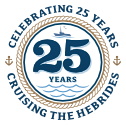

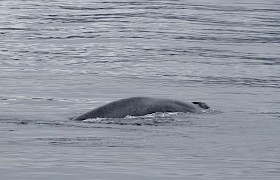
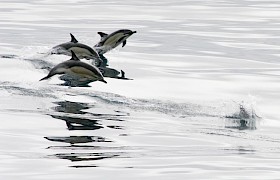
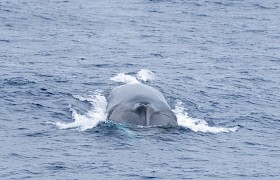
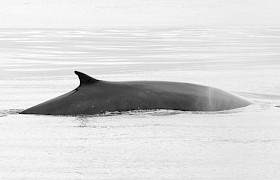
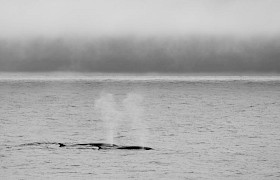
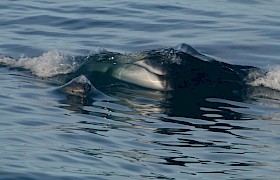
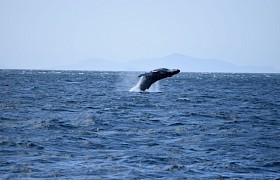
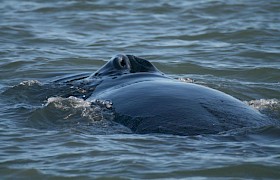
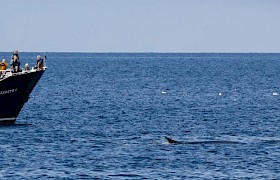
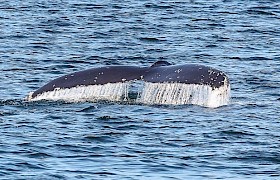
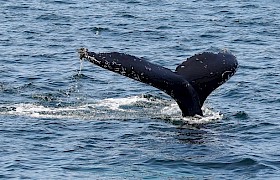
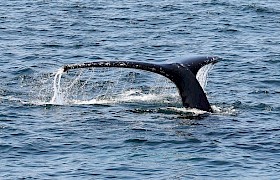






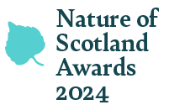
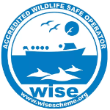












Greatest thanks to Hebrides Cruises for the trip of a lifetime. Amazing crew. Skipper Angus, Bosun Craig, wildlife expert Zoe and the most amazing chef Sarah who went out of her way to accommodate us. Thank you all.
Joanie Gray: 16 July 2022St Kilda and the isles of the Outer Hebrides